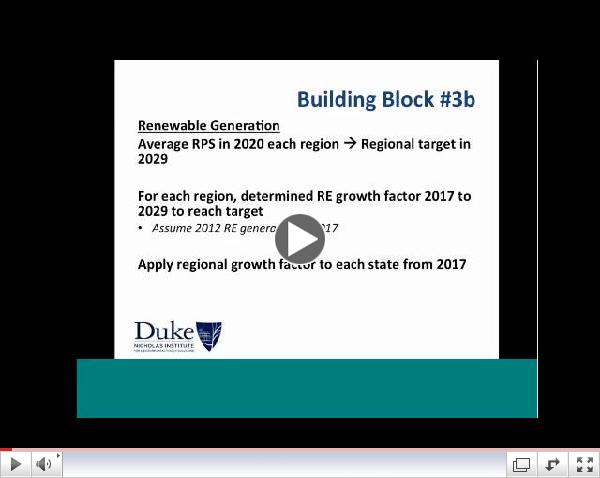|
|
|
Nicholas Institute for Environmental Policy Solutions - August 6, 2014
|
|
|
August 14-18
Glasgow, Scotland
International Marine Conservation Congress
October 22-24
Raleigh, NC
2014 Southeast Alternative Fuels Conference & Expo
For information on other upcoming events, visit the Nicholas Institute for Environmental Policy Solutions website.
|
 | |
Understanding the EPA's Proposed Clean Power Plan
|
|
|
|
|
| Paper Looks at Clean Power Plan Debate
 A new paper by researchers at the Nicholas Institute for Environmental Policy Solutions aims to address what the EPA's Clean Power Plan means for policy choices aimed at securing future carbon dioxide mitigation goals. The analysis explores the long-term consequences of several key regulatory design choices under this rule, including mass-based versus rate-based standards, tradable versus non-tradable standards and a single standard for all fossil fuel power plants versus differentiated standards for coal plants and natural gas plants. It finds that the consequences of these choices may be significant. Differentiated standards lead to relatively greater investment in coal retrofits and non-tradable standards lead to relatively greater retirement of coal capacity, outcomes that could create different costs for securing deeper greenhouse gas reductions in the future. How the EPA's proposed rule for existing power plants is viewed, as a final or interim solution, could also affect tradeoffs associated with key policy choices. A new paper by researchers at the Nicholas Institute for Environmental Policy Solutions aims to address what the EPA's Clean Power Plan means for policy choices aimed at securing future carbon dioxide mitigation goals. The analysis explores the long-term consequences of several key regulatory design choices under this rule, including mass-based versus rate-based standards, tradable versus non-tradable standards and a single standard for all fossil fuel power plants versus differentiated standards for coal plants and natural gas plants. It finds that the consequences of these choices may be significant. Differentiated standards lead to relatively greater investment in coal retrofits and non-tradable standards lead to relatively greater retirement of coal capacity, outcomes that could create different costs for securing deeper greenhouse gas reductions in the future. How the EPA's proposed rule for existing power plants is viewed, as a final or interim solution, could also affect tradeoffs associated with key policy choices.
|
The Future of Marine Protected Areas
Linwood Pendleton, senior scholar at the Nicholas Institute, is among the experts interviewed by MPA News for a story about enforcement of marine protected areas. In the Q&A, Pendleton discusses fines and their social impact as well as the concept of optimality and its application. |
| Paper Assesses Mangrove Valuation Data
A new Nicholas Institute paper identifies gaps in data and knowledge regarding mangrove ecosystem services valuations and recommends ways that future research could advance understanding of mangrove ecology, ecosystem services valuation, and conservation.
|
| Course Explores Impacts of Sea-Level Rise
Graduate and undergraduate students from around the world explored the impacts sea-level rise will have on coastal cities and areas as part of a two-week program in Venice, Italy, offered by Duke University. Brian Murray, director of the Nicholas Institute's Environmental Economics Program, was among the faculty members teaching the course in a city where rising waters are a constant threat.
|
| Institute Welcomes New Board Members
Two Duke faculty members joined the Nicholas Institute's Board of Advisors as ex officios in July: Professor Jeff Vincent and new Nicholas School of the Environment Dean Alan Townsend.
|
| Openings for Students, Staff
Job openings at the Nicholas Institute provide opportunities for selected candidates to play a role in the leading environmental debates of our time. Current openings include Ocean and Coastal Policy Program Director, Website Administrator and Student Communications Assistant.
|
|
The Nicholas Institute for Environmental Policy Solutions helps decision makers create timely, effective, and economically practical solutions to the world's critical environmental challenges.
|
|
|
|
|
|
|
|
|
|
Nicholas Institute for Environmental Policy Solutions, Duke University,
P.O. Box 90335, Durham, NC 27708.
|
|
|